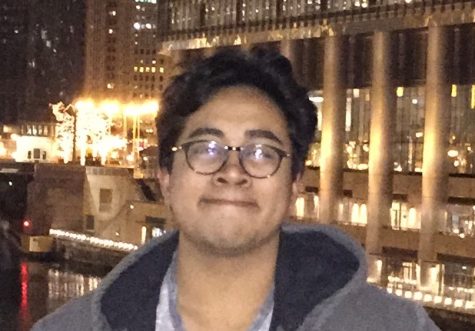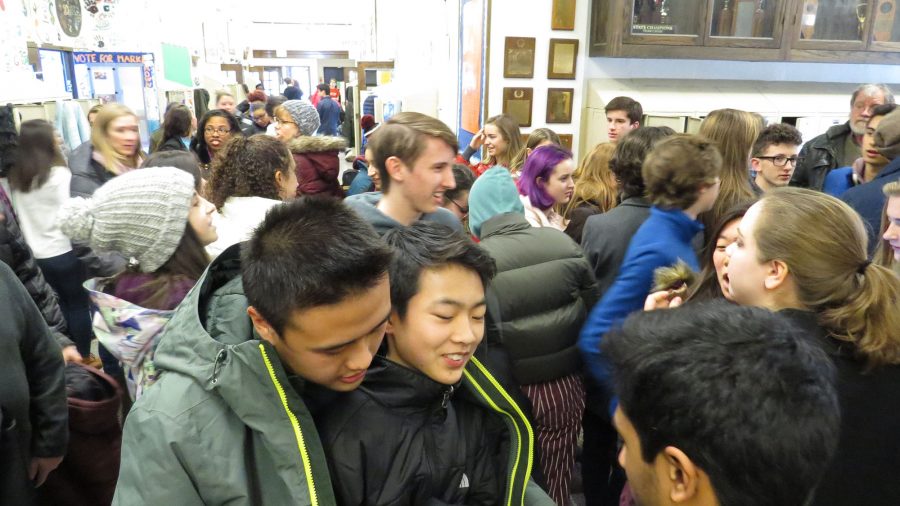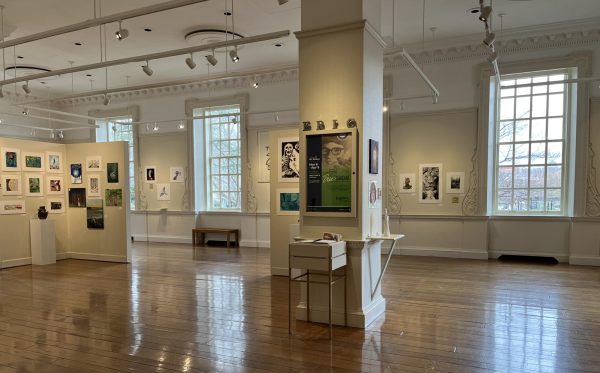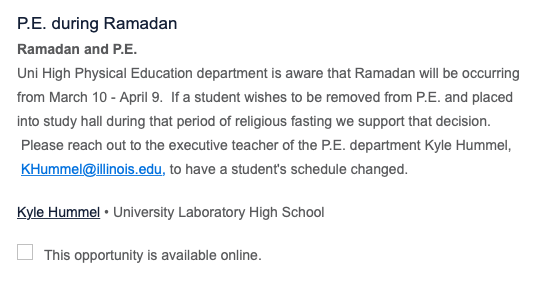Uni students head out in masses in response to Trump’s administration
In the few weeks since President Trump took office, Uni students have largely responded with opposition to the new president. Dozens of students have taken part in marches and protests opposing Mr. Trump’s policies and various stances he has taken.
On Friday, over 100 students marched to the Central Illinois Mosque and Islamic Center to show solidarity with the local Muslim community. The march was triggered by the president’s executive order banning people from seven Muslim-majority countries from entering the US.
At the start of Uni Period, a crowd of students gathered in the senior alcove and spilled out into the adjoining halls as they prepared to march. Junior Omeed Miraftab-Salo, who organized the march a mere three days prior, stood on a table facing the crowd. He reminded the audience of their purpose there, to “make a statement that this is not right” and, he added jokingly to “impeach Trump.” The crowd responded with resounding laughter and applause.
Miraftab-Salo led the crowd, accompanied by a reporter and photographer from the News Gazette, in a steady stream through the south exit and headed west on Springfield. While they walked students chattered casually among themselves as if this were an everyday outing. Students of all grades – from subfreshman to senior – were counted among the marchers. Faculty walked alongside their students in participation: Kathy Rodems, Dave Stone, and Ben Leff were spotted in the crowd. Assistant Director Karl Radnitzer brought up the rear.
Upon arriving at the mosque, they were greeted by a mosque community member who was pleasantly surprised, having expected only 20-30 visitors. The group then split up by gender, with the mosque having separate sections for men and women. They entered the mosque and stood in silence outside of the main prayer hall as the congregation prayed. After the prayer finished, a speaker praised the students for their actions and gyros and muffins were handed out to students and faculty.
Two weeks prior, on the first full day of Trump’s presidency, people across the world took to the streets on in reaction to President Trump’s inauguration. Although the main event was in Washington DC, where the inauguration took place, in Champaign, as many as 5,000 people gathered in West Side Park in preparation of the march. Estimates had been in the hundreds, but were blown out of the water by the actual turnout. According to sophomore Nathalie Stein, the surprising number of people forced her to wait half an hour before actually commencing the march.
At the park, several female community leaders gave speeches on the topics that led them there that day. Sophomores Lili Banihashem and Xanthe Brown said that they were inspired by the speakers and the turnout, despite the extensive standing they had to endure.
Although the march was in response to one man, the banners under which people marched were wide and far-reaching. A large number of people appeared to be marching in response to the various derogatory remarks the president had made towards women. In particular, there were a number of references to the audio tape released in early October in which Trump spoke the famous line, “Grab them by the pussy,” which was seen by many as an utter disgrace. Others seemed to take a more general oppositional stance against Trump, like a poster that read, “The power of the people is stronger than the people in power.”
An issue that attendees noted was that intersectionality – the inclusion people of various races, religions, sexualities, and backgrounds, could have been improved upon. Speaking on what she took away from the march, Stein said that “we [activists] have to work together,” but must also “recognize their privilege.” Stein also noted that most of the marchers were white women. Senior Clara Pokorny, who attended the march in Washington DC, said that she thought intersectionality was dealt with well, but also pointed out that the references to female genitalia could’ve been potentially excluding to transgender women. While posing for the picture featured in this article, sophomore Kate Snyder said “Diversity,” with a chuckle, referencing that all of the people in the picture were white.
The variety of the speakers reflected this diversity – sophomore Nathalie Stein noted that there were representatives from Black Lives Matter and the local Muslim community giving speeches.
Emotions were running high as a result of both marches. Freshman Ahmad Bobat said that he felt good “because there were more people than expected. I heard there would be only 10-15 people.” Speaking on the crowd, freshman Amina Gurmen said that “they were really respectful and willing to participate in the prayer.” Students also noted how the atmosphere in Uni differed from other schools. Sophomore Ayat Jaber said that while her previous school wasn’t racist, she believes at Uni “there’s more of a maturity about it, there’s more substance to it and standing up for what’s right.”
Participants of the Women’s March were hopeful for the continuation of a movement against Trump. Banihashem said that “as long as Trump keeps doing outrageous stuff,” she doubts the movement will falter. Junior Mallika Luthar was comforted by the march, saying that it “definitely made a statement” and “helped [her]realize [she] was not alone in [her] ideals and [her] beliefs and that there’s an entire community ready to fight for women’s rights.”

I started journalism first semester of junior year. In my free time, I like to read and write. I also like superheroes and video games. My favorite superhero...


